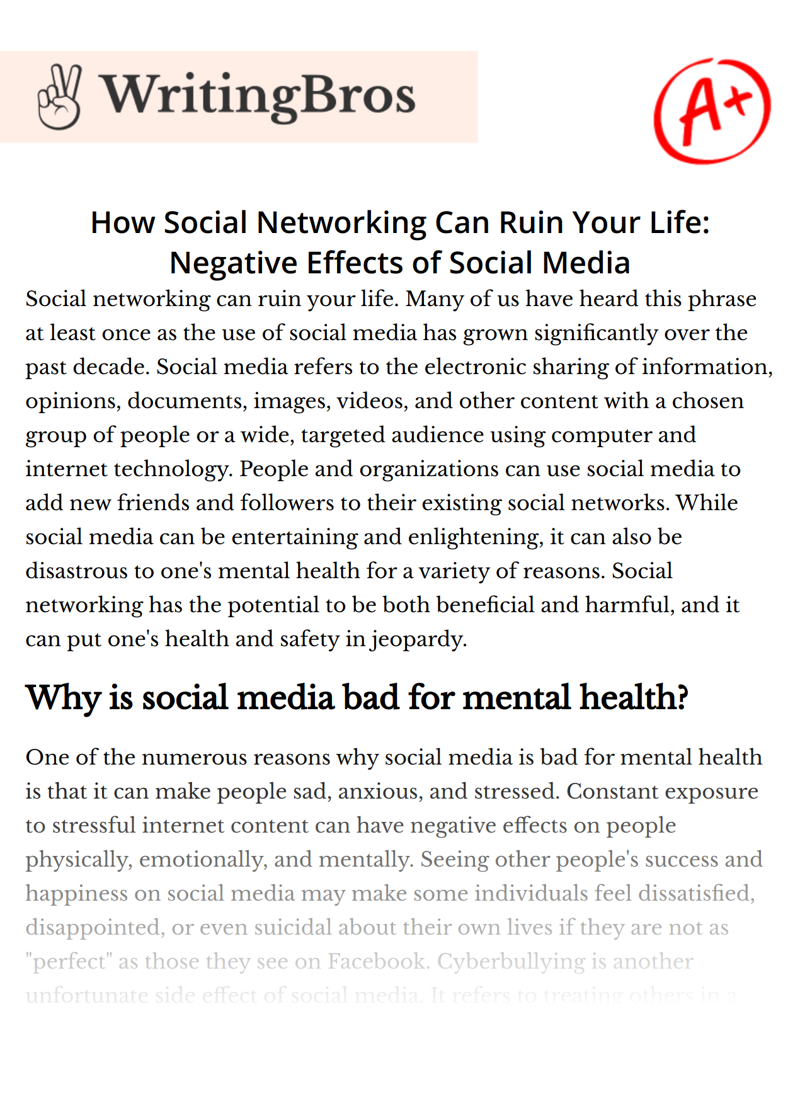How Social Networking Can Ruin Your Life: Negative Effects of Social Media

Table of contents
- Why is social media bad for mental health?
- Why social media is bad: a conclusion
- References
Social networking can ruin your life. Many of us have heard this phrase at least once as the use of social media has grown significantly over the past decade. Social media refers to the electronic sharing of information, opinions, documents, images, videos, and other content with a chosen group of people or a wide, targeted audience using computer and internet technology. People and organizations can use social media to add new friends and followers to their existing social networks. While social media can be entertaining and enlightening, it can also be disastrous to one's mental health for a variety of reasons. Social networking has the potential to be both beneficial and harmful, and it can put one's health and safety in jeopardy.
Why is social media bad for mental health?
One of the numerous reasons why social media is bad for mental health is that it can make people sad, anxious, and stressed. Constant exposure to stressful internet content can have negative effects on people physically, emotionally, and mentally. Seeing other people's success and happiness on social media may make some individuals feel dissatisfied, disappointed, or even suicidal about their own lives if they are not as "perfect" as those they see on Facebook.
Cyberbullying is another unfortunate side effect of social media. It refers to treating others in a cruel and inhumane way. Due to the internet, bullying is no longer confined to face-to-face interactions, and bullies can use social media to cause harm to others. Cyberbullying includes personal insults, harassing or discriminatory actions, publishing libelous material, misrepresenting oneself online, disclosing private information, social isolation, and cyberstalking. Internet bullying causes no physical harm to the victim, but can lead to emotional and mental instability. People who have been cyberbullied on social media may feel pressured to harm themselves, including committing suicide.
Media platforms also contribute to the development of a negative body image. Seeing pictures of other people on social media makes it tempting to compare one's appearance to them. It is hard to stay away from content online that makes individuals feel less confident about themselves because most people only post about what is going well in their life. Looking at material that individuals see when utilizing technology can cause them to worry more about how they look. It is not a good idea to compare oneself to others. People tend to find ways to improve their appearance when they post photos of themselves online, using photoshop and other editing tools to make their pictures look better. Most people do not want others to read the posts that they make online if they appear to be bad. Wanting to weigh more or less after looking at an image of someone else online can cause individuals to have an eating disorder.
As a result of exposure to social media, individuals may have inaccurate ideas about relationships and the nature of their life. Not everything they see on social media is authentic, and despite the fact that their lives may be less than ideal, people may appear to have a perfect life online. One of the most common reasons people appear to be happy while publishing on social media is to get more "likes" on a post. In some situations, getting "likes" on a social media post can boost someone's self-esteem. A person who receives a great number of likes on a post may assume that the amount is meaningful and advantageous. Receiving positive feedback from others may increase a person's confidence and make them believe their likes and positive remarks have value. However, not getting many likes might make someone feel uncomfortable, self-conscious, and ineffectual. If they believe they are not as good as other people on social media who have more likes than them, they may feel self-conscious and unhappy.
Why social media is bad: a conclusion
In conclusion, social media has become an integral part of our daily lives, and while it provides numerous benefits, it can also have a negative impact on our mental health. The constant exposure to stressful content, cyberbullying, negative body image, and inaccurate ideas about relationships and life can all contribute to mental health issues such as anxiety, depression, and low self-esteem. Therefore, it is important to be mindful of our social media use and its potential impact on our mental well-being. We can take steps to mitigate these negative effects, such as limiting our screen time, unfollowing accounts that make us feel bad about ourselves, and seeking professional help when necessary. By being more conscious of how we use social media, we can ensure that it enhances rather than detracts from our overall quality of life.
References
- Twenge, J. M., & Campbell, W. K. (2019). Associations between screen time and lower psychological well-being among children and adolescents: Evidence from a population-based study. Preventive Medicine Reports, 15, 100928. https://doi.org/10.1016/j.pmedr.2019.100928
- Lin, L. Y., Sidani, J. E., Shensa, A., Radovic, A., Miller, E., Colditz, J. B., ... & Primack, B. A. (2016). Association between social media use and depression among US young adults. Depression and Anxiety, 33(4), 323-331. https://doi.org/10.1002/da.22466
- Rosen, L. D., Whaling, K., Carrier, L. M., Cheever, N. A., & Rokkum, J. (2013). The media and technology usage and attitudes scale: An empirical investigation. Computers in Human Behavior, 29(6), 2501-2511. https://doi.org/10.1016/j.chb.2013.07.009
- Kross, E., Verduyn, P., Demiralp, E., Park, J., Lee, D. S., Lin, N., ... & Ybarra, O. (2013). Facebook use predicts declines in subjective well-being in young adults. PloS one, 8(8), e69841. https://doi.org/10.1371/journal.pone.0069841
- Turel, O., & Qahri-Saremi, H. (2016). Problematic use of social media: Antecedents and consequences. Information Systems Journal, 26(2), 99-118. https://doi.org/10.1111/isj.12082
Cite this Essay
To export a reference to this article please select a referencing style below

